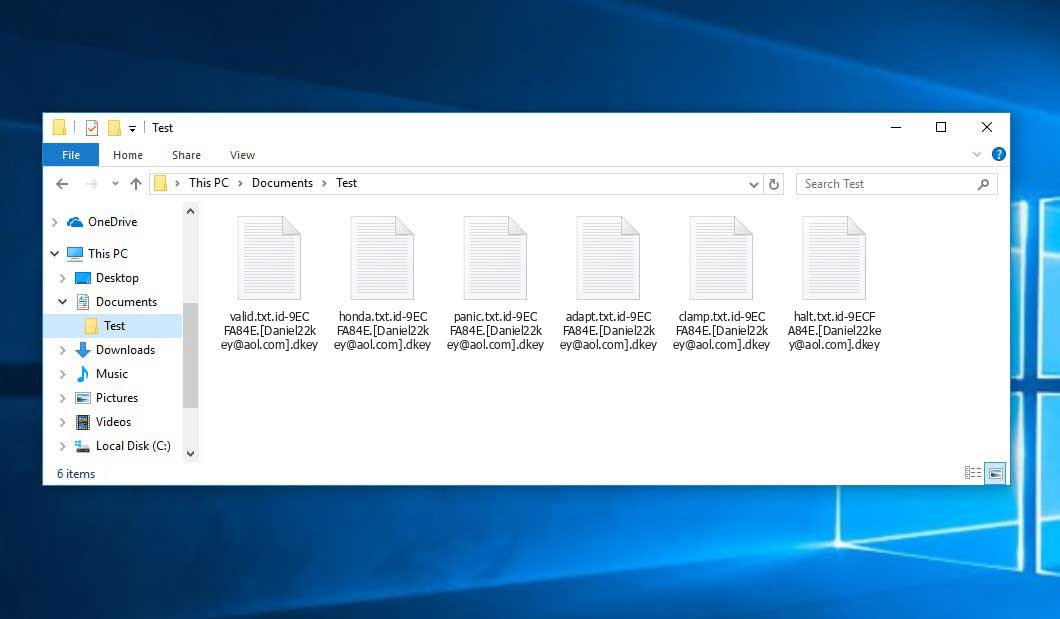Malware analyst Tomas Meskauskas was the one who originally described the Dkey virus, which belongs under the Dharma ransomware family. Ransomware of such sort encrypts all the data on your computer (photos, documents, excel tables, music, videos, etc) and appends its extra extension to every file.
What is known about the Dkeyvirus?
☝️ A scientifically correct description for the Dkey would be “a Dharma family ransomware malicious agent”.
The renaming will be done by the following scheme: .dkey. After the encryption, a file entitled, for instance, “report.docx” will be altered to “report.docx.id-9ECFA84E.[[email protected]].dkey”.
The ransom note most probably contains a description of how to buy the decryption tool from the Dkey developers. You can get this decrypting software after contacting [email protected], [email protected] through email. That is pretty much the scheme of the felony.
Dkey overview:
| Name | Dkey Virus |
| Ransomware family1 | Dharma ransomware |
| Extension | .dkey |
| Contact | [email protected], [email protected] |
| Detection | MSIL/Slithermon.A, MSIL/Filecoder.SLAM.A, OScope.Trojan.MSIL.Basic.8 |
| Symptoms | Your files (photos, videos, documents) have a .dkey extension and you can’t open them. |
| Fix Tool | See If Your System Has Been Affected by Dkey virus |
The note coming in package with the Dkey ransomware states the following:
YOUR FILES ARE ENCRYPTED Don\'t worry,you can return all your files! If you want to restore them, follow this link:email [email protected] YOUR ID - If you have not been answered via the link within 12 hours, write to us by e-mail:[email protected] Attention! Do not rename encrypted files. Do not try to decrypt your data using third party software, it may cause permanent data loss. Decryption of your files with the help of third parties may cause increased price (they add their fee to our) or you can become a victim of a scam.
In the screenshot below, you can see what a directory with files encrypted by the Dkey looks like. Each filename has the “.dkey” extension added to it.
How did my machine catch Dkey ransomware?
There is a huge number of possible ways of ransomware infiltration.
There are currently three most popular ways for hackers to have the Dkey virus settled in your digital environment. These are email spam, Trojan introduction and peer networks.
If you access your mailbox and see emails that look just like notifications from utility services providers, delivery agencies like FedEx, web-access providers, and whatnot, but whose sender is strange to you, be wary of opening those letters. They are most likely to have a ransomware file attached to them. So it is even riskier to download any attachments that come with letters like these.
Another thing the hackers might try is a Trojan virus model2. A Trojan is a program that gets into your computer pretending to be something else. For example, you download an installer of some program you need or an update for some service. However, what is unboxed turns out to be a harmful program that corrupts your data. Since the update wizard can have any name and any icon, you have to make sure that you can trust the resource of the stuff you’re downloading. The best thing is to use the software developers’ official websites.
As for the peer-to-peer file transfer protocols like torrents or eMule, the threat is that they are even more trust-based than the rest of the Web. You can never guess what you download until you get it. Our suggestion is that you use trustworthy resources. Also, it is reasonable to scan the folder containing the downloaded objects with the antivirus as soon as the downloading is complete.
How do I get rid of the Dkey virus?
It is crucial to inform you that besides encrypting your data, the Dkey virus will probably deploy the Azorult Spyware on your machine to seize your credentials to different accounts (including cryptocurrency wallets). The mentioned program can derive your credentials from your browser’s auto-filling cardfile.
Sometimes criminals would decode few of your files to prove that they do have the decryption program. Since Dkey virus is a relatively new ransomware, anti-malware designers have not yet found a way to undo its work. Nevertheless, the decoding tools are constantly updated, so the solution may soon arrive.
Sure thing, if the tamperers do the job of encrypting someone’s critical files, the desperate person will most likely comply with their demands. Despite that, paying to criminals gives no guarantee that you’re getting your files back. It is still dangerous. After getting the money, the racketeers may deliver a wrong decryption code to the victim. There were reports of malefactors simply disappearing after getting the money without even bothering to reply.
The best safety measure against ransomware is to have aan OS restore point or the copies of your critical files in the cloud drive or at least on an external drive. Obviously, that might be insufficient. Your most crucial thing could be that file you were working upon when it all went down. Nevertheless, it is something. It is also advisable to scan your drives with the antivirus program after the OS is rolled back.
Dkey is not the only ransomware of its kind, since there are other specimens of ransomware out there that act in the same manner. Examples of those are Oflg, Ofww, Aawt, and some others. The two major differences between them and the Dkey are the ransom amount and the method of encryption. The rest is almost identical: documents become blocked, their extensions changed, ransom notes are found in each directory containing encrypted files.
Some lucky people were able to decode the arrested files with the help of the free software provided by anti-ransomware specialists. Sometimes the hackers accidentally send the decoding key to the wronged in the ransom readme. Such an extraordinary fail allows the injured part to restore the files. But of course, one should never expect such a chance. Make no mistake, ransomware is a tamperers’ instrument to pull the money out of their victims.
How сan I avoid ransomware injection?
Dkey ransomware doesn’t have a endless power, neither does any similar malware.
You can protect your computer from its infiltration in three easy steps:
- Never open any letters from unknown senders with unknown addresses, or with content that has nothing to do with something you are waiting for (how can you win in a lottery without even taking part in it?). If the email subject is more or less something you are waiting for, scrutinize all elements of the suspicious letter with caution. A hoax email will surely contain a mistake.
- Avoid using cracked or unknown programs. Trojans are often distributed as an element of cracked software, most likely as a “patch” which prevents the license check. Understandably, untrusted programs are difficult to tell from reliable ones, because trojans sometimes have the functionality you need. Try searching for information on this software product on the anti-malware message boards, but the optimal way is not to use such software.
- And finally, to be sure about the safety of the objects you downloaded, use GridinSoft Anti-Malware. This program will be a perfect shield for your PC.
Reasons why I would recommend GridinSoft3
There is no better way to recognize, remove and prevent ransomware than to use an anti-malware software from GridinSoft4.
Download Removal Tool.
You can download GridinSoft Anti-Malware by clicking the button below:
Run the setup file.
When setup file has finished downloading, double-click on the setup-antimalware-fix.exe file to install GridinSoft Anti-Malware on your PC.
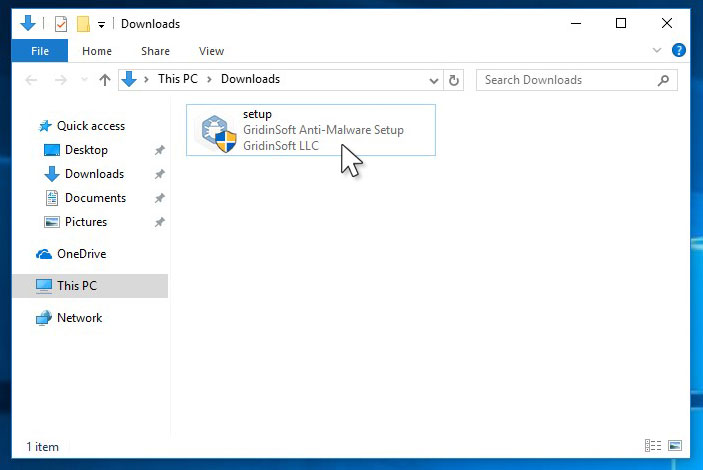
An User Account Control asking you about to allow GridinSoft Anti-Malware to make changes to your device. So, you should click “Yes” to continue with the installation.
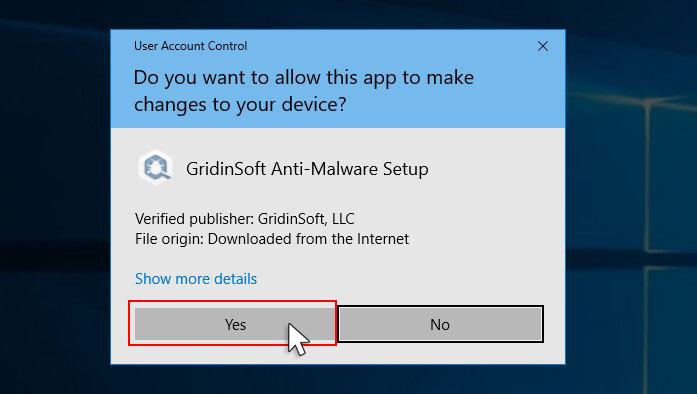
Press “Install” button.
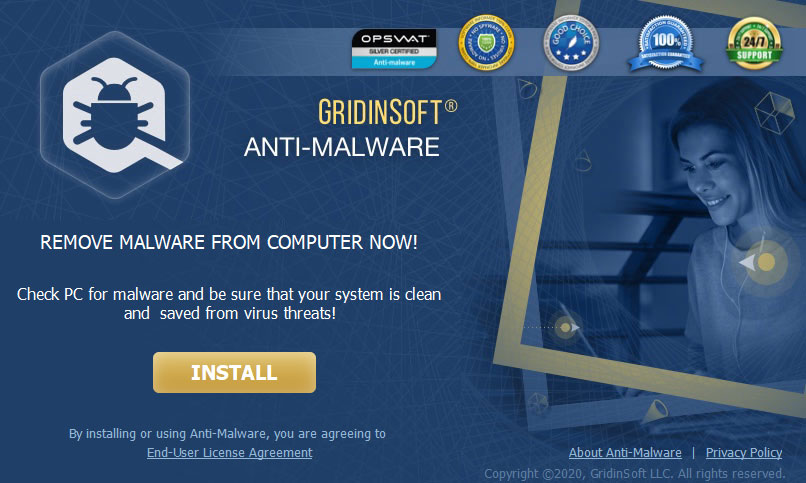
Once installed, Anti-Malware will automatically run.
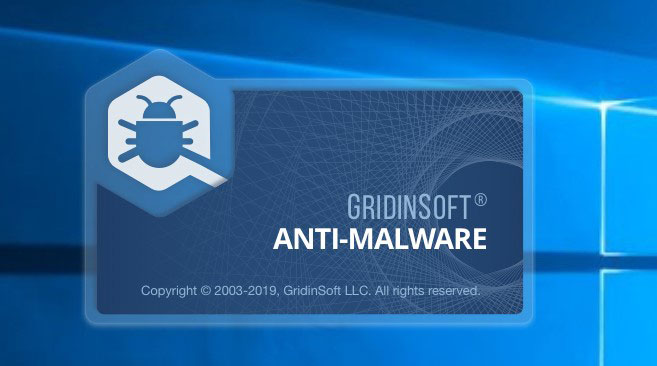
Wait for the Anti-Malware scan to complete.
GridinSoft Anti-Malware will automatically start scanning your computer for Dkey infections and other malicious programs. This process can take a 20-30 minutes, so I suggest you periodically check on the status of the scan process.
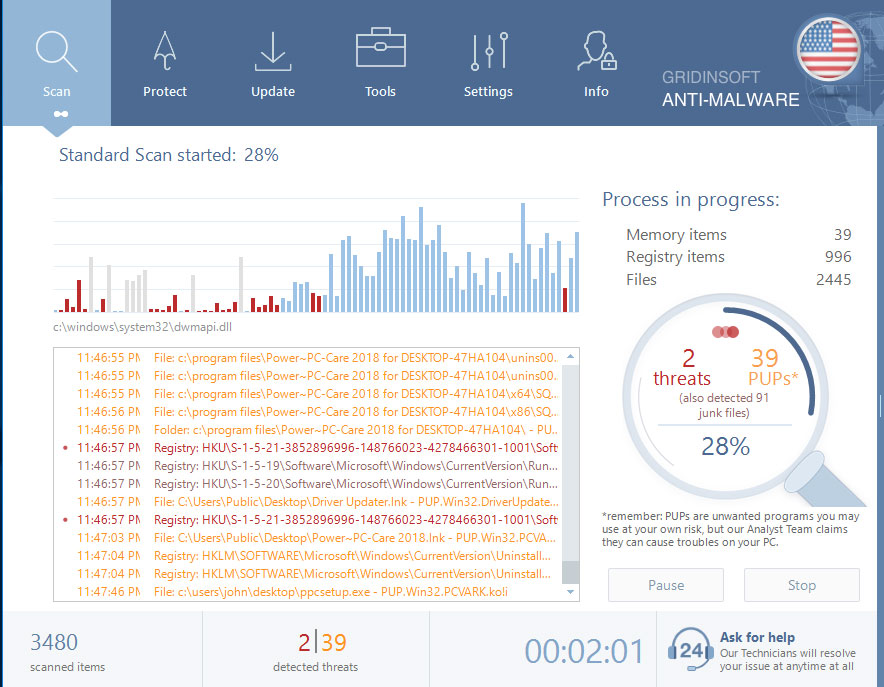
Click on “Clean Now”.
When the scan has finished, you will see the list of infections that GridinSoft Anti-Malware has detected. To remove them click on the “Clean Now” button in right corner.
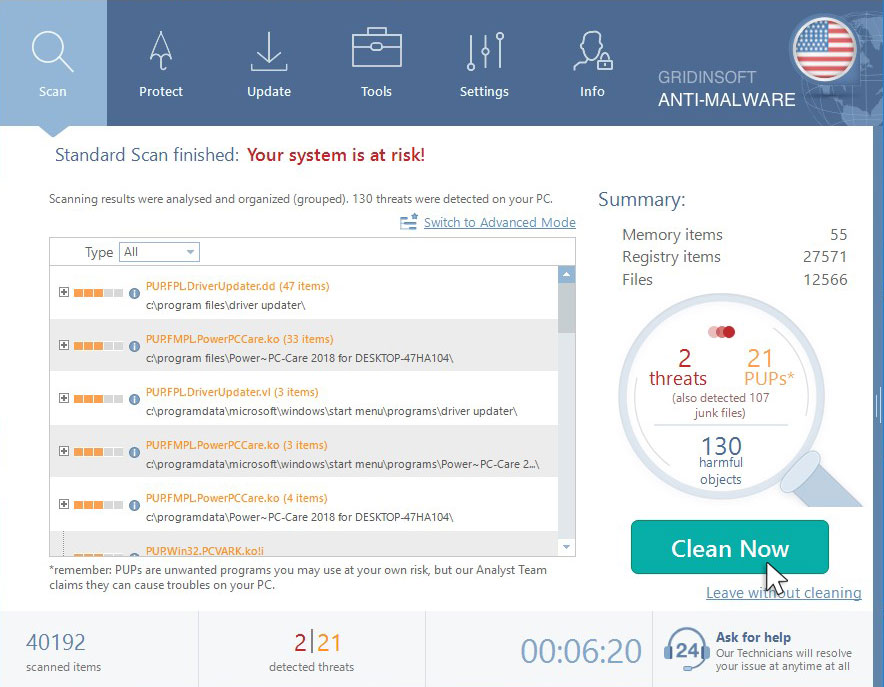
FAQ
🤔 Are the “.dkey” files accessible?
There’s no way to do it, unless the files “.dkey” files are decrypted.
🤔 The encrypted files are very important to me. How can I decrypt them quickly?
Hopefully, you have made a copy of those important files. In case you haven’t, there is still a chance that you do have a Restore Point from some time ago to roll back the whole system to the moment when it had no virus yet, but already had your files. There are other ways to beat ransomware, but they take time.
🤔 You have advised using GridinSoft Anti-Malware to get rid of the Dkey virus. Does it mean that all my files, currently encrypted, will be removed too?
Of course not. Unlike the ransomware program itself, the encrypted files do not jeopardize your system.
With the help of GridinSoft Anti-Malware, you can clean your computer off the actual threats. The malware that has infected your PC is must be still functional and it scans your system periodically to encrypt any new files you might create on your computer after the initial attack. As it has been mentioned above, the Dkey ransomware comes with the company. It installs backdoors and keyloggers that can steal your account credentials and provide criminals with easy access to your computer after some time.
🤔 What should I do if the Dkey ransomware has blocked my computer and I can’t get the activation code.
In such an unfortunate situation, you need to have a flash memory drive with a previously installed Trojan Killer. Use Safe Mode to perform the cleaning. The point is that the ransomware runs automatically as the system boots and encrypts any new files created or brought into your system. To stop this function – use Safe Mode, which allows only the essential programs to run automatically. Consider reading our manual on booting Windows in Safe Mode.
🤔 What could help the situation right now?
Some of the encrypted files can be found elsewhere.
- If you sent or received your critical files by email, you could still download them from your online mailbox.
- You might have shared photographs or videos with your friends or family members. Simply ask them to send those images back to you.
- If you have initially downloaded any of your files from the Internet, you can try doing it again.
- Your messengers, social networks pages, and cloud drives might have all those files too.
- It might be that you still have the needed files on your old computer, a notebook, mobile, external storage, etc.
USEFUL TIP: You can use data recovery programs5 to retrieve your lost information since ransomware encrypts the copies of your files, removing the authentic ones. In the tutorial below, you can learn how to recover your files with PhotoRec, but remember: you won’t be able to do it before you kill the virus with an anti-malware program.
Also, you can contact the following official fraud and scam sites to report this attack:
- In the United States: On Guard Online;
- In Canada: Canadian Anti-Fraud Centre;
- In the United Kingdom: Action Fraud;
- In Australia: SCAMwatch;
- In New Zealand: Consumer Affairs Scams;
- In France: Agence nationale de la sécurité des systèmes d’information;
- In Germany: Bundesamt für Sicherheit in der Informationstechnik;
- In Ireland: An Garda Síochána;
To report the attack, you can contact local executive boards. For instance, if you live in USA, you can have a talk with FBI Local field office, IC3 or Secret Service.
I need your help to share this article.
It is your turn to help other people. I have written this guide to help people like you. You can use the buttons below to share this on your favorite social media Facebook, Twitter, or Reddit.
Brendan SmithHow to Remove DKEY Ransomware & Recover PC
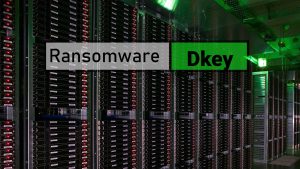
Name: DKEY Virus
Description: DKEY Virus is a ransomware-type infections. This virus encrypts important personal files (video, photos, documents). The encrypted files can be tracked by a specific .dkey extension. So, you can't use them at all.
Operating System: Windows
Application Category: Virus
User Review
( votes)References
- My files are encrypted by ransomware, what should I do now?
- You can read more on Trojans, their use and types in the Trojan-dedicated section of GridinSoft official website.
- GridinSoft Anti-Malware Review from HowToFix site: https://howtofix.guide/gridinsoft-anti-malware/
- More information about GridinSoft products: https://gridinsoft.com/comparison
- Here are Best Data Recovery Software Of 2023.


